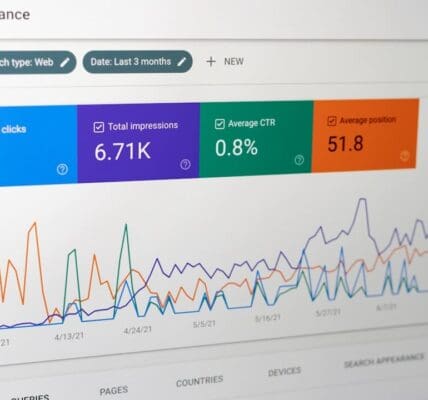Search Engine Optimization (SEO) is the practice of optimizing a website to improve its visibility and ranking on search engine results pages (SERPs). In today’s digital age, where consumers rely heavily on search engines to find information, products, and services, SEO has become an essential marketing strategy for businesses. By implementing effective SEO techniques, businesses can increase their online visibility, drive organic traffic to their website, and ultimately boost their sales and revenue.
Key Takeaways
- SEO is the process of optimizing your website to rank higher on Google search results.
- Keyword research helps you identify the words and phrases your target audience is searching for.
- On-page optimization involves optimizing your website’s title tags, meta descriptions, and content for relevant keywords.
- High-quality and engaging content can help improve your website’s search engine rankings.
- Building quality backlinks from reputable websites can improve your website’s authority and visibility on Google.
Understanding the basics of SEO for Google
Google is the most popular search engine, with over 90% of global search engine market share. Understanding how Google’s search algorithm works is crucial for optimizing a website for better visibility on the platform. Google’s algorithm uses various factors to determine the relevance and quality of a website’s content and rank it accordingly on the SERPs.
One of the most important factors in Google’s algorithm is the use of keywords. Keywords are words or phrases that users enter into the search bar when looking for information. By conducting keyword research and analysis, businesses can identify the most relevant and high-volume keywords in their industry and strategically incorporate them into their website’s content.
Conducting keyword research and analysis
Keyword research and analysis are essential steps in any SEO strategy. By identifying the right keywords, businesses can optimize their website’s content to match what users are searching for. There are several tools available that can help with keyword research, such as Google Keyword Planner, SEMrush, and Moz Keyword Explorer.
When conducting keyword research, it’s important to consider factors such as search volume, competition, and relevance. High-volume keywords may attract more traffic, but they also tend to have higher competition. It’s important to strike a balance between high-volume keywords and long-tail keywords (more specific phrases with lower search volume but less competition).
Optimizing on-page elements for better SEO
| On-page Element | Importance for SEO | Optimization Tips |
|---|---|---|
| Title Tag | High | Include target keyword, keep it under 60 characters |
| Meta Description | Medium | Include target keyword, keep it under 155 characters |
| Header Tags | High | Use H1 for main title, H2 for subheadings, include target keyword |
| Image Alt Text | Medium | Include target keyword, describe image accurately |
| Internal Links | High | Link to relevant pages within your site, use descriptive anchor text |
| URL Structure | Medium | Include target keyword, keep it short and descriptive |
| Content | High | Include target keyword, provide valuable and relevant information |
On-page elements refer to the various components of a webpage that can be optimized for better SEO. These include title tags, meta descriptions, header tags, URL structure, and keyword placement within the content.
Title tags are HTML elements that define the title of a webpage. They appear as the clickable headline on the SERPs and should accurately describe the content of the page while incorporating relevant keywords. Meta descriptions, on the other hand, are brief summaries of a webpage’s content that appear below the title tag on the SERPs. They should be compelling and informative, enticing users to click on the link.
Header tags (H1, H2, H3, etc.) are used to structure the content on a webpage. They help search engines understand the hierarchy and organization of the content. It’s important to include relevant keywords in header tags to improve SEO.
Creating high-quality and engaging content
High-quality and engaging content is crucial for SEO success. Google’s algorithm prioritizes websites that provide valuable and relevant information to users. By creating content that is informative, well-written, and engaging, businesses can increase their chances of ranking higher on the SERPs.
When creating content, it’s important to focus on providing value to the reader. This can be done by answering common questions or addressing pain points within your industry. Incorporating relevant keywords naturally throughout the content is also important for SEO.
Additionally, using multimedia elements such as images, videos, and infographics can make your content more engaging and shareable. This can help attract more backlinks and social media shares, which are important factors in Google’s algorithm.
Building quality backlinks to your website

Backlinks are links from other websites that point back to your website. They are an important factor in Google’s algorithm as they indicate that your website is trustworthy and authoritative. Building quality backlinks can significantly improve your website’s visibility and ranking on the SERPs.
There are several strategies for building backlinks. One effective method is to create high-quality content that other websites will want to link to. This can be achieved by conducting original research, creating informative guides or tutorials, or publishing thought-provoking articles.
Another strategy is to reach out to other website owners and influencers in your industry and ask them to link to your content. This can be done through email outreach or by participating in online communities and forums where you can share your content.
Leveraging social media for SEO benefits
Social media can have a significant impact on SEO. While social media signals (such as likes, shares, and comments) are not direct ranking factors in Google’s algorithm, they can indirectly influence SEO by increasing brand visibility, driving traffic to your website, and attracting backlinks.
To leverage social media for SEO benefits, it’s important to create a strong social media presence and engage with your audience regularly. Share your content on social media platforms and encourage your followers to share it as well. Engage with your audience by responding to comments and messages promptly.
Additionally, consider using social media advertising to reach a wider audience and drive more traffic to your website. By targeting specific demographics and interests, you can attract users who are more likely to engage with your content and potentially convert into customers.
Enhancing your website’s user experience
User experience (UX) plays a crucial role in SEO. Google’s algorithm takes into account factors such as page load speed, mobile-friendliness, and overall user satisfaction when ranking websites on the SERPs.
To enhance your website’s user experience, start by optimizing its loading speed. Slow-loading websites can lead to higher bounce rates and lower rankings on the SERPs. Use tools like Google PageSpeed Insights to identify areas for improvement and make necessary optimizations.
Mobile-friendliness is another important aspect of UX. With the increasing use of mobile devices for internet browsing, Google prioritizes mobile-friendly websites in its search results. Ensure that your website is responsive and displays properly on different screen sizes.
Finally, focus on creating a user-friendly navigation structure and intuitive design. Make it easy for users to find the information they’re looking for and navigate through your website. This can help improve user satisfaction and increase the chances of users staying on your website longer, which can positively impact SEO.
Monitoring and measuring your SEO performance
Monitoring and measuring your website’s SEO performance is essential to understand what strategies are working and what areas need improvement. There are several tools available that can help track your website’s SEO performance, such as Google Analytics, Google Search Console, and third-party SEO tools like Moz or SEMrush.
Google Analytics provides valuable insights into your website’s traffic, including the number of visitors, their demographics, and the sources of traffic. It also allows you to track specific goals or conversions, such as form submissions or purchases.
Google Search Console provides data on how your website is performing in Google’s search results. It shows you which keywords are driving traffic to your website, how often your website appears in search results, and any issues that may be affecting your website’s visibility.
Third-party SEO tools like Moz or SEMrush offer additional insights into your website’s SEO performance, including keyword rankings, backlink analysis, and competitor research.
Staying up-to-date with Google’s algorithm updates
Google regularly updates its search algorithm to provide users with the most relevant and high-quality search results. Staying up-to-date with these algorithm updates is crucial for maintaining and improving your website’s visibility on the SERPs.
Google’s algorithm updates can have a significant impact on SEO strategies. For example, the introduction of the mobile-first index prioritized mobile-friendly websites in search results. The introduction of RankBrain, Google’s machine learning algorithm, changed how Google understands search queries and ranks websites accordingly.
To stay up-to-date with Google’s algorithm updates, follow reputable SEO blogs and industry news websites. These sources often provide insights and analysis on the latest updates and how they may impact SEO strategies. Additionally, consider joining online communities and forums where SEO professionals share their experiences and knowledge.
Hiring an SEO expert to help boost your website’s visibility
While implementing SEO strategies can be done by businesses themselves, hiring an SEO expert can provide several benefits. SEO experts have in-depth knowledge and experience in optimizing websites for better visibility on search engines. They stay up-to-date with the latest trends and algorithm updates, allowing them to implement effective strategies that drive results.
When hiring an SEO expert, it’s important to do thorough research and ask for references or case studies of their previous work. Look for someone who has experience in your industry and understands your target audience. Additionally, make sure to communicate your goals and expectations clearly to ensure a successful partnership.
SEO is a crucial marketing strategy for businesses in today’s digital age. By implementing effective SEO techniques, businesses can increase their online visibility, drive organic traffic to their website, and ultimately boost their sales and revenue. Understanding the basics of SEO for Google, conducting keyword research and analysis, optimizing on-page elements, creating high-quality content, building quality backlinks, leveraging social media, enhancing user experience, monitoring performance, staying up-to-date with algorithm updates, and considering hiring an SEO expert are all important steps in achieving SEO success. By implementing these tips and strategies, businesses can improve their website’s visibility on search engines and reach their target audience effectively.
FAQs
What is search engine optimization (SEO)?
Search engine optimization (SEO) is the process of optimizing a website or web page to rank higher in search engine results pages (SERPs) for specific keywords or phrases.
Why is SEO important for businesses?
SEO is important for businesses because it helps them to increase their online visibility, drive more traffic to their website, and ultimately generate more leads and sales.
What is Google?
Google is a search engine that allows users to search the internet for information, websites, images, videos, and more.
How does Google determine search engine rankings?
Google uses a complex algorithm to determine search engine rankings, which takes into account a variety of factors such as website content, backlinks, user experience, and more.
What is a keyword?
A keyword is a word or phrase that users enter into a search engine to find information on a specific topic.
What is on-page optimization?
On-page optimization refers to the process of optimizing individual web pages in order to rank higher in search engine results pages and earn more relevant traffic.
What is off-page optimization?
Off-page optimization refers to the process of optimizing a website’s external factors, such as backlinks and social media presence, in order to improve its search engine rankings.
What are backlinks?
Backlinks are links from other websites that point to your website. They are an important factor in determining search engine rankings because they indicate that other websites consider your content to be valuable and relevant.
What is a meta description?
A meta description is a brief summary of a web page’s content that appears in search engine results pages. It is important to write a compelling meta description that accurately reflects the content of the page and encourages users to click through to your website.












